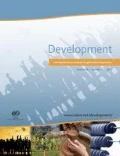Abstract
The global economic crisis of 2008 has provoked considerable debate on unregulated markets and the need for more effective state regulation. Shahra Razavi draws attention to an important arena of social development, the arena of unpaid care, that is often ‘invisible’ but one that is likely to experience particular strain as the global economic crisis unfolds. Short of a paradigm shift, the paper argues that what is needed as a first step is to interrogate development processes and ‘economic’ policies through a ‘care lens’. It is also necessary to scrutinize the multiplicity of institutional sites where care is produced, and the extent to which ‘social’ policies contest or reinforce gender and class inequalities.
Similar content being viewed by others
Notes
The ‘other crisis’ alludes to Susan Donath's ‘other economy’ where ‘the direct production and maintenance of human beings’ take place (2000: 116).
An important effort is under way by the President of the United Nations (UN) General Assembly, Father Miguel d’Escoto Brockmann, and his team to turn the planned UN Economic Summit (24–26 June 2009) into a real global summit where the rules of the game can be re-written in order to create the basis for a new global economy that can also serve the interests of developing countries.
There have been calls in the United States for public hearings modelled e.g., on the ‘Stock Exchange Practices Hearings’ conducted by the Senate Banking Committee between 1932 and 1934, to shed light on the deeper causes of the crisis in order to institute a new framework of financial regulation and supervision. (http://www.policyinnovations.org/ideas/policy_library/data/01522, accessed 12 May 2009).
Reference here is to the 53rd Session of the United Nations Commission on the Status of Women (CSW), which was convened in March 2009 with the working title ‘Equal sharing of responsibilities between women and men, including care-giving in the context of HIV/AIDS’.
References
Bakker, Isabella (1994) The Strategic Silence: Gender and economic policy, London: Zed Books.
Bedford, Kate (2007) ‘The Imperative of Male Inclusion: How institutional context influences world bank gender policy’, International Journal of Feminist Politics 9 (3): 289–311.
Budlender, Debbie and Ruth Meena (2009) ‘Care Provision in a Low Income Country: A case study of Tanzania’, unpublished report, Geneva: UNRISD.
Donath, Susan (2000) ‘The Other Economy: A suggestion for a distinctive feminist economics’, Feminist Economics 6 (1): 115–123.
Elson, Diane (1998) ‘The Economic, the Political and the Domestic: Businesses, states and households in the organization of production’, New Political Economy 3 (2): 189–208.
Elson, Diane (2002a) ‘International Financial Architecture: A view from the Kitchen’, Politica Femina: Zeitschrift fur feministische Politik-Wissenschaft 11 (1).
Elson, Diane (2002b) ‘Gender Justice, Human Rights, and Neo-Liberal Economic Policies’, in Maxine Molyneux and Shahra Razavi (eds.) Gender Justice, Development, and Rights, Oxford: Oxford University Press.
Gonzalez de la Rocha, Mercedes (1988) ‘Economic Crisis, Domestic Reorganization and Women's Work in Guadalajara, Mexico’, Bulletin of Latin American Research 7 (2): 207–223.
Palriwala, Rajni and Neetha Pillai (2009) ‘Paid Care Workers in India: Domestic workers and Anganwandi workers’, unpublished report, Geneva: UNRISD.
Razavi, Shahra (2007) ‘Does Paid Work Enhance Women's Access to Welfare? Evidence from selected industrializing countries’, Social Politics 14 (1): 58–92.
Seguino, Stephanie (2009) ‘The Global Economic Crisis, its Gender Implications, and Policy Responses’, paper presented at the 53rd session of the Commission on the Status of Women, United Nations, New York, USA, 5 March 2009.
Singh, Ajit and Ann Zammit (2000) ‘International Capital Flows: Identifying the gender dimension’, World Development 26 (7): 1249–1268.
Solow, Robert M. (2009) ‘How to Understand the Disaster’, New York Review of Books 56 (8): 4–8.
Teplova, Tatyana (2007) ‘Welfare State Transformation, Childcare, and Women's Work in Russia’, Social Politics 14 (3): 284–322.
Tronto, Joan (1993) Moral Boundaries: A political argument for an ethic of care, New York and London: Routledge.
Tronto, Joan (2009) ‘Democratic Care Politics in a World of Limits’, keynote address delivered at the UNRISD Conference, ‘The Political and Social Economy of Care’, Barnard College, Columbia University, New York, USA, 6 March 2009.
Whitehead, Ann (1981) ‘ “I’m Hungry Mum”: The politics of domestic budgeting’, in Kate Young, Carol Wolkowitz and Roslyn McCullagh (eds.) Of Marriage and the Market, London and New York: Routledge.
Additional information
Draws attention to the often invisible arena of unpaid care
Rights and permissions
About this article
Cite this article
Razavi, S. From Global Economic Crisis to the ‘Other Crisis’. Development 52, 323–328 (2009). https://doi.org/10.1057/dev.2009.33
Published:
Issue Date:
DOI: https://doi.org/10.1057/dev.2009.33




